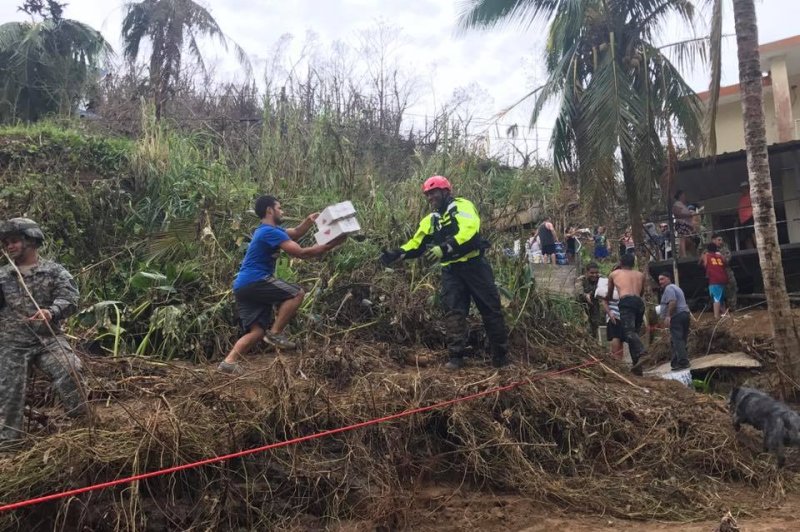1 of 4 | New York Task Force 1 assisted the Puerto Rico National Guard on Wednesday in delivering water and food to an isolated community in Puerto Rico after Hurricane Maria. Photo courtesy FEMA/Twitter
Sept. 28 (UPI) -- President Donald Trump's administration on Thursday waived a federal law to allow relief shipments to reach Puerto Rico, as the island continues to struggle to provide life-sustaining services after Hurricane Maria.
Press secretary Sarah Sanders first announced the waiver for the Jones Act, and said it will "go into effect immediately."
Trump granted the waiver after it was requested by Puerto Rico Gov. Ricardo Rossello, who thanked the president Thursday morning. Elaine Duke, acting secretary of the Department of Homeland Security, approved the request.
"This waiver will ensure that over the next 10 days, all options are available to move and distribute goods to the people of Puerto Rico," she said in a statement. "It is intended to ensure we have enough fuel and commodities to support lifesaving efforts, respond to the storm and restore critical services and critical infrastructure operations in the wake of these devastating storms."
The Jones Act requires that ships traveling from one U.S. port to another must be American-flagged vessels with U.S. crews. Goods going from the mainland to Puerto Rico, for example, must be on U.S. ships -- even if faster or less expensive means are available.
The act was lifted during the recoveries of Texas and Florida after recent hurricanes.
Trump has been repeatedly asked in recent days to grant the waiver to allow critical relief aid to reach Puerto Rico.
Food, medical supplies and clean water are scarce on the island, which is still mostly without power. Although relief efforts are underway, critics have noted that the Trump administration has been slow to authorize federal help for the island, a U.S. territory.
Cargo ships have been delivering aid to the port of San Juan all week, and supplies are piling up on docks. The facilities have become choke points in distribution of water, food, soap and other materials in cargo containers. Personnel are unavailable to unload the goods and trucks lack fuel and drivers, officials say.
"There are plenty of ships and plenty of cargo to come into the island," said Mark Miller, a spokesman for shipping company Crowley Maritime Corp. "From there, that's where the supply chain breaks down, getting the goods from the port to the people on the island who need them."
The U.S. government has shipped 4 million army-style ready-to-eat meals, and 1.6 million gallons of water. Six tankers holding 76,000 gallons of gasoline and diesel fuel are anchored in waters near the island, Bloomberg reported Thursday.
Homeland Security adviser Tom Bossert, during the White House press briefing Thursday, told reporters that federal officials may consider airdrops to deliver supplies if they can't be delivered otherwise, but as of now, "if airdrops are under consideration, I'm not aware of it."
Bossert there are more than 10,000 federal workers and volunteers in Puerto Rico to assist with relief efforts and that more than 25 U.S. Navy ships were en route to the island.
He said Lt. Gen. Jeffrey Buchanan, a three-star general and commander of U.S. Army North, would be sent to Puerto Rico to handle the distribution of supplies there.
As officials try and get emergency supplies to the island, a medical crisis continues to evolve.
Most hospitals in Puerto Rico remain closed and those open are relying on diesel-powered generators. Hospitals have diminishing supplies of medical supplies and fuel and a reduced level of personnel. Doctors' offices and walk-in clinics remain closed, and only emergency care is provided anywhere.
"We have seen some broken bones and cuts, and then because of these unstable conditions, we have unstable asthma patients, diabetes patients," said Domingo Cruz Vivaldi of San Juan's San Jorge Hospital. He added that little preventative medicine is available.
In rural Puerto Rico, 80 percent of crops were destroyed by the hurricane, the territory's Department of Agriculture said. Families are rationing food. One, the family of Edgardo Matias, has been wandering forests near their damaged home in search of vegetables, oranges and coconuts. So far, no assistance from any governmental agency has reached his home in the mountain city of Utuado, Puerto Rico's third largest.
Officials have said the town's five outbound roads remain blocked with debris, and three of its 11 bridges have collapsed.















